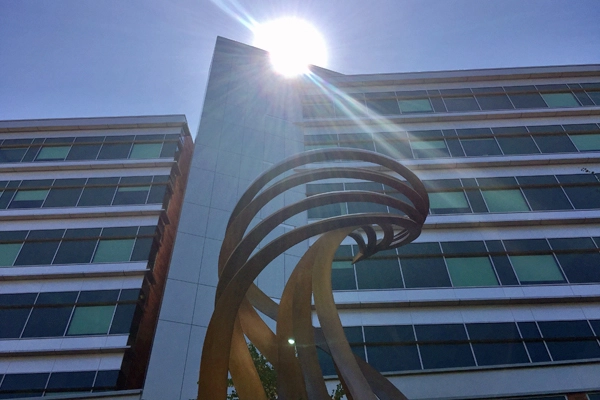Take care in forecasted extreme heat

The staff and physicians of Salem Hospital’s emergency department want area residents to stay healthy and safe. Here are some tips to help you, your children, your elderly parents, and even your pets, stay safe — and what to do if you have problems in the heat.
“There are some simple things people can do to stay cool during heat waves,” says Nancy Bee, RN, BSN, CEN, Emergency Department manager. “First of all, staying hydrated with water is essential and avoid alcohol and caffeine as they increase water loss.”
Stay well hydrated
- Drink two to three quarts of non-caffeinated fluid per day.
- Do not limit intake to just water. You also need electrolytes, which you can get from a variety of sports drinks.
- If you are thirsty, you have waited too long.
- One way to tell if you are getting enough fluid is to look at your urine. In general, it should be clear. A yellow color means you need to drink more water — unless it is affected by food, vitamin, medication or caffeine intake.
- Limit alcohol intake. It doesn’t count toward your water consumption and it can impair your judgment.
- Be smart about outdoor activities.
- Stay inside, unless your job requires you to be outdoors.
- If you have to be outdoors, avoid strenuous activities between the hottest times of the day — typically from 10 a.m. to 4 p.m.
- If you need to be outdoors, prime the pump before you go: Start your fluid intake before you take your first step outside.
- Wear sun block and a hat.
- You might also use a water sprayer (mister) to cool off. Battery-operated, hand-held fans may also be helpful.
“Speaking of water, it has great power to cool,” added Bee. “Place a damp cool cloth on your neck or head to keep cool. You can also soak your feet in a cool bath. Last but not least, remember to check on pets and elder neighbors as both have a harder time regulating temperature and using the same cooling methods with a damp cloth can work for them.”
Some people need extra precautions
- High heat can cause confusion.
- The very young and the elderly are most prone to thermal-regulation problems — their bodies simply have a harder time regulating heat. They especially should avoid the outdoors and manage their fluid intake. This is also true for people with chronic illnesses, like those on dialysis.
- Children can become dehydrated much more quickly than adults. Be sure they get enough fluid and follow all heat and sun-safety procedures.
- Don’t overdress newborns. If you’re wearing a tank top and shorts, then a similar outfit for your baby is appropriate — whether it’s a shorts outfit or simply a t-shirt and diaper. Stay in the shade. Use a lukewarm washcloth to cool baby — and carry a blanket to protect the baby when you enter air-conditioned extremes.
- Some medications can cause problems during heat spells, particularly some psychiatric medications and diuretics. Talk with your pharmacist if you have concerns.
- Notice a distressed pet in a hot car? Call 911 if you can’t locate the owner quickly.
Be safe in the water
- When it gets hot, it can be tempting to jump in the river to cool off. Be careful. Remember, Oregon rivers are cold — even on hot days. Do no dive into rivers or ponds — they may be shallow.
- Wear a lifejacket on boats and in the river.
- Do not drink alcohol.
- Parents should closely watch their children in the water — plus people who have mental or physical disabilities.
- If you have a backyard pool, make sure it has a fence around it.
Warning signs and what to do if you experience them
- Heat illness goes through three stages: heat cramps, exhaustion, and then heat stroke.
- If you experience heat cramps, you will have muscle cramps and feel dizzy. You need to get in the shade and use a cold compress and take fluids.
- With heat exhaustion, you will sweat excessively and look pale. Get in the shade, use a cold compress, and drink fluids. I-V fluids may be needed.
- If you are having a heat stroke, you will be very pale and have a fever. You will not be able to sweat and you will be mentally confused. Your body core temperature has gotten too high. Call 911!
This summer promises to be a hot one and Salem Health encourages you to play it safe and prevent heat-related illness!
Salem Health offers exceptional care to people in and around Oregon’s mid-Willamette Valley. It comprises hospitals in Salem and Dallas, a medical group of primary and specialty care providers, plus other affiliated services. Visit us at www.salemhealth.org; “Like” us on www.facebook.com/salemhealth; follow us on Twitter: @salemhealth; and view us at www.youtube.com/salemhealth.